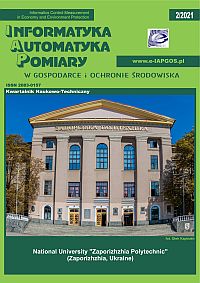SPOSÓB UZYSKANIA CHARAKTERYSTYKI WIDMOWEJ MIKROSKOPU SONDY SKANUJĄCEJ
##plugins.themes.bootstrap3.article.sidebar##
Open full text
Numer Tom 11 Nr 2 (2021)
-
KROK W KIERUNKU METODY FUZJI DECYZJI OPARTEJ NA WIĘKSZOŚCI DLA WALIDACJI WYNIKÓW KLASTERYZACJI
Taras Panskyi, Volodymyr Mosorov4-13
-
ROZMYTE PODEJŚCIE DO LOKALIZACJI URZĄDZEŃ NA PODSTAWIE SIŁY SYGNAŁU SIECI BEZPRZEWODOWYCH
Michał` Socha, Wojciech Górka, Marcin Michalak14-21
-
ZASTOSOWANIE METOD CYFROWEGO PRZETWARZANIA OBRAZU DO UZYSKIWANIA KONTURÓW OBIEKTÓW NA OBRAZACH ULTRASONOGRAFICZNYCH STAWU BIODROWEGO
Pavlo Ratushnyi, Yosyp Bilynskyi, Stepan Zhyvotivskyi22-25
-
PRZEGLĄD WYKORZYSTANIA URZĄDZEŃ RENTGENOWSKICH W BADANIACH JAKOŚCI ELEKTRONIKI
Magdalena Michalska26-29
-
BADANIA SYMULACYJNE I EKSPERYMENTALNE MASZYNY KŁOWEJ ZE WZBUDZENIEM HYBRYDOWYM I PAKIETOWANYM RDZENIEM WIRNIKA
Marcin Wardach, Paweł Prajzendanc, Kamil Cierzniewski, Michał Cichowicz, Szymon Pacholski, Mikołaj Wiszniewski, Krzysztof Baradziej, Szymon Osipowicz30-35
-
STACJE WYMIANY AKUMULATORÓW SAMOCHODÓW ELEKTRYCZNYCH
Aleksander Chudy36-39
-
ZABEZPIECZENIE NADNAPIĘCIOWE MIKROINSTALACJI PV – WYMAGANIA I MODEL SYMULACYJNY
Klara Janiga40-43
-
OKREŚLANIE PARAMETRÓW HYDRODYNAMICZNYCH USZCZELNIONEGO EKSTRAKTORA
Nataliaya Kosulina, Stanislav Kosulin, Kostiantyn Korshunov, Tetyana Nosova, Yana Nosova44-47
-
OPRACOWANIE URZĄDZENIA DO POMIARU I ANALIZY DRGAŃ
Anzhelika Stakhova, Volodymyr Kvasnikov48-51
-
SPOSÓB UZYSKANIA CHARAKTERYSTYKI WIDMOWEJ MIKROSKOPU SONDY SKANUJĄCEJ
Mariia Kataieva, Vladimir Kvasnikov52-55
-
SZEROKOPASMOWE SATELITARNE SIECI DANYCH W KONTEKŚCIE DOSTĘPNYCH PROTOKOŁÓW I PLATFORM CYFROWYCH
ENGLISHJacek Wilk-Jakubowski56-60
Archiwum
-
Tom 13 Nr 4
2023-12-20 24
-
Tom 13 Nr 3
2023-09-30 25
-
Tom 13 Nr 2
2023-06-30 14
-
Tom 13 Nr 1
2023-03-31 12
-
Tom 12 Nr 4
2022-12-30 16
-
Tom 12 Nr 3
2022-09-30 15
-
Tom 12 Nr 2
2022-06-30 16
-
Tom 12 Nr 1
2022-03-31 9
-
Tom 11 Nr 4
2021-12-20 15
-
Tom 11 Nr 3
2021-09-30 10
-
Tom 11 Nr 2
2021-06-30 11
-
Tom 11 Nr 1
2021-03-31 14
-
Tom 10 Nr 4
2020-12-20 16
-
Tom 10 Nr 3
2020-09-30 22
-
Tom 10 Nr 2
2020-06-30 16
-
Tom 10 Nr 1
2020-03-30 19
-
Tom 9 Nr 4
2019-12-16 20
-
Tom 9 Nr 3
2019-09-26 20
-
Tom 9 Nr 2
2019-06-21 16
-
Tom 9 Nr 1
2019-03-03 13
##plugins.themes.bootstrap3.article.main##
DOI
Authors
Abstrakt
W artykule omówiono metody i algorytmy cyfrowego przetwarzania i filtracji podczas nano-pomiarów z wykorzystaniem mikroskopu z sondą skanującą. Badane są metody korekcji częstotliwości obrazu, w szczególności wykorzystanie transformaty Fouriera z różnymi metodami filtracji w celu poprawy jakości otrzymanego obrazu. Opracowano stabilne algorytmy obliczeniowe do konwersji sygnałów dyskretnych na podstawie transformaty Fouriera. Przedstawiono metody interpretacji numerycznych wyników dyskretnej transformaty Fouriera w takich pakietach jak Matlab, MathCad, Matematica. Proponuje się zastosowanie transformacji okienkowej opracowanej na podstawie transformaty Fouriera, która pozwala wyodrębnić charakterystykę informacyjną sygnału i zmniejszyć wpływ czynników destabilizujących występujących podczas przetwarzania sygnału z mikroskopu z sondą skanującą w warunkach rzeczywistych.
Słowa kluczowe:
Bibliografia
Addison P. S.: Secondary transform decoupling of shifted nonstationary signal modulation components: application to photoplethysmography. Int. J. Wavelets Multires. Inf. Proc. 2, 2004, 43–57. DOI: https://doi.org/10.1142/S0219691304000329
Falvo M. et al.: The nanomanipulator: A teleoperator for manipulating materials at the nanomerter scale. Proc. of Int. Symp. On Science and Technology of Atomically Engineered Materials, 1996, 579–586.
Hyon C. K. et al.: Application of atomic-force-microscope direct patterning to selective positioning of InAs quantum dots on GaAs. Applied Physics Letters 77, 2000, 2607–2609. DOI: https://doi.org/10.1063/1.1318393
Ito K. J. et al.: Servomechanism for locking scanning tunneling microscope tip over surface nanostructures. Rev. of Sci. Inst. 71(2), 2000, 420–423. DOI: https://doi.org/10.1063/1.1150217
Iwasaki H., Yoshinobu T., Sudoh K.: Nanolithography on SiO2/Si with a scanning tunneling microscope. Nanotechnology 14, 2003, 55–62. DOI: https://doi.org/10.1088/0957-4484/14/11/R01
Majumdar A. et al.: Nanometer-scale lithography using the atomic force microscope. Applied Physics Letters 61, 2002, 2293–2295. DOI: https://doi.org/10.1063/1.108268
Mokaberi B., Requicha A. A. G.: Drift compensation for automatic nanomanipulation with scanning probe microscopes. IEEE Trans. on Automation Science and Engineering 3(3), 2006, 199–207. DOI: https://doi.org/10.1109/TASE.2006.875534
Mokaberi B., Requicha A. A. G.: Towards automatic nanomanipulation drift compensation in scanning probe microscopes. IEEE Int. Conf. on Robotics and Automation, New Orleans, LA, 2004. DOI: https://doi.org/10.1109/ROBOT.2004.1307185
Ohji H. et al.: Fabrication of a beam-mass structure using single-step electrochemical etching for micro structures (SEEMS). J. Micromech. Microeng. 10, 2000, 440–444. DOI: https://doi.org/10.1088/0960-1317/10/3/320
Roth S., Dellmann L., Racine G. A., de Rooij N. F.: High aspect ratio UV photolithography for electroplated structures. J. Micromech. Mecroeng. 9, 2009, 105–108. DOI: https://doi.org/10.1088/0960-1317/9/2/001
Sahoo D. R. et al.: Transient signal based sample detection in atomic force microscopy. Applied Physics Letters 83(26), 2003, 5521–5523. DOI: https://doi.org/10.1063/1.1633963
Said R. A.: Microfabrication by localized electrochemical deposition: experimental investigation and theoretical modeling. Nanotechnology 15, 2004, 867. DOI: https://doi.org/10.1088/0957-4484/15/7/C01
Salapaka S., De T.: A new sample-profile estimate for faster imaging in atomic force microscopy. Proceedings of the American Control Conference, Boston, MA, 2004. DOI: https://doi.org/10.1115/IMECE2005-80511
Salapaka М. V. et al.: Multimode noise analysis of cantilevers for scanning probe microscopy. Journal of Applied Physics 81(6), 1997, 2480–2487. DOI: https://doi.org/10.1063/1.363955
San Paulo A., Garcia R.: Tip-surface forces, amplitude and energy dissipation in amplitude–modulation (tapping mode) force microscopy. Physical Review B. 64, 2002, 041406 (1–4). DOI: https://doi.org/10.1103/PhysRevB.64.193411
Sebastian A. et al.: Robust control approach to atomic force microscopy. Proceedings of the IEEE Conference on Decision and Control, Hawai, 2003.
Staub R. at al.: Drift elimination in the calibration of scanning probe microscopes. Rev. Sci. Inst. 66(3), 1995, 2513–2516. DOI: https://doi.org/10.1063/1.1145650
Yang Q., Jagannathan S.: Nanomanipulation using atomic force microscope with drift compensation. Proceedings of the 2006 American Control Conference, Minneapolis, Minnesota, USA, 2006.
Yang S. et al.: Block phase correlation-based automatic drift compensation for atomic force microscopes. IEEE Int. Conf. on Nanotechnology, Nagoya, Japan, 2005.
Yaseen A. S. at al.: Speech signal denoising with wavelet-transforms and the mean opinion score characterizing the filtering quality. Proc. SPIE. 9707, 2016, 970719. DOI: https://doi.org/10.1117/12.2211384
##plugins.themes.bootstrap3.article.details##
Abstract views: 368
Licencja

Utwór dostępny jest na licencji Creative Commons Uznanie autorstwa – Na tych samych warunkach 4.0 Miedzynarodowe.






